Leadership in Healthcare Management: Culture and Performance
VerifiedAdded on 2022/12/28
|12
|3175
|409
Essay
AI Summary
This essay delves into the crucial role of leadership within healthcare organizations, emphasizing its significance in shaping organizational values and fostering a positive working environment. The introduction highlights the influence of leaders in motivating and guiding individuals toward common goals, particularly in the context of decision-making and enhancing efficiency. The discussion section explores the multifaceted aspects of leadership, including the importance of respect for patients and staff, the impact of organizational culture on performance, and the role of leaders in establishing these values. The essay examines barriers to effective leadership, such as disrespectful treatment, and emphasizes the need for leaders to maintain respectful behavior across different cultural communities. It also highlights the importance of cooperative leadership, trust-building, and effective communication in fostering a positive organizational culture. Furthermore, the essay explores the relationship between culture and organizational performance, emphasizing the need for healthcare leaders to promote gender equality and adapt to different service models. The conclusion reiterates the value of leadership in achieving organizational goals, particularly through cooperative strategies that prioritize culture and respect. The essay underscores the significance of training and strategies for effective communication and ethical guidelines in healthcare management, emphasizing the impact of leadership on patient satisfaction and overall organizational success.

Leadership in Health Management
Paraphrase This Document
Need a fresh take? Get an instant paraphrase of this document with our AI Paraphraser
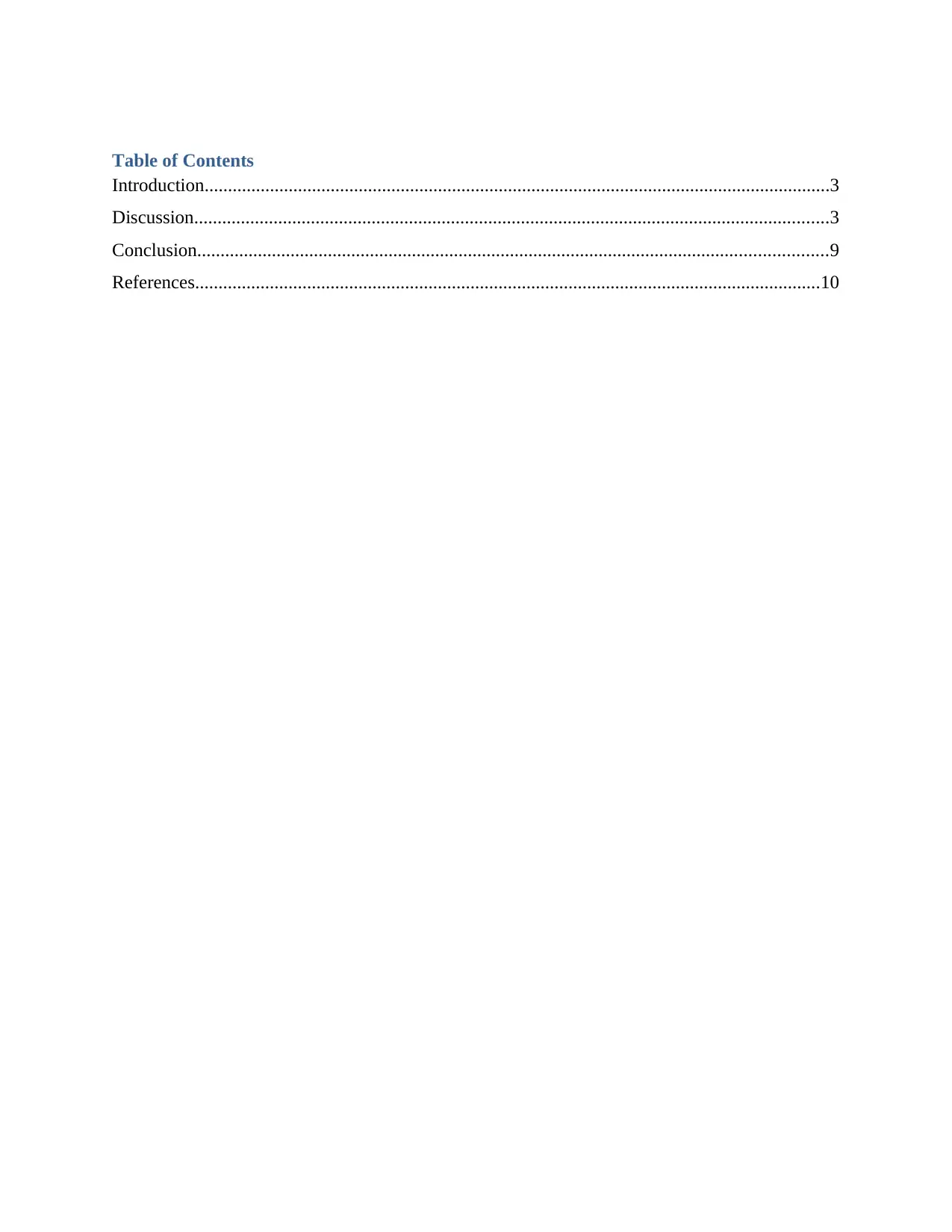
Table of Contents
Introduction......................................................................................................................................3
Discussion........................................................................................................................................3
Conclusion.......................................................................................................................................9
References......................................................................................................................................10
Introduction......................................................................................................................................3
Discussion........................................................................................................................................3
Conclusion.......................................................................................................................................9
References......................................................................................................................................10
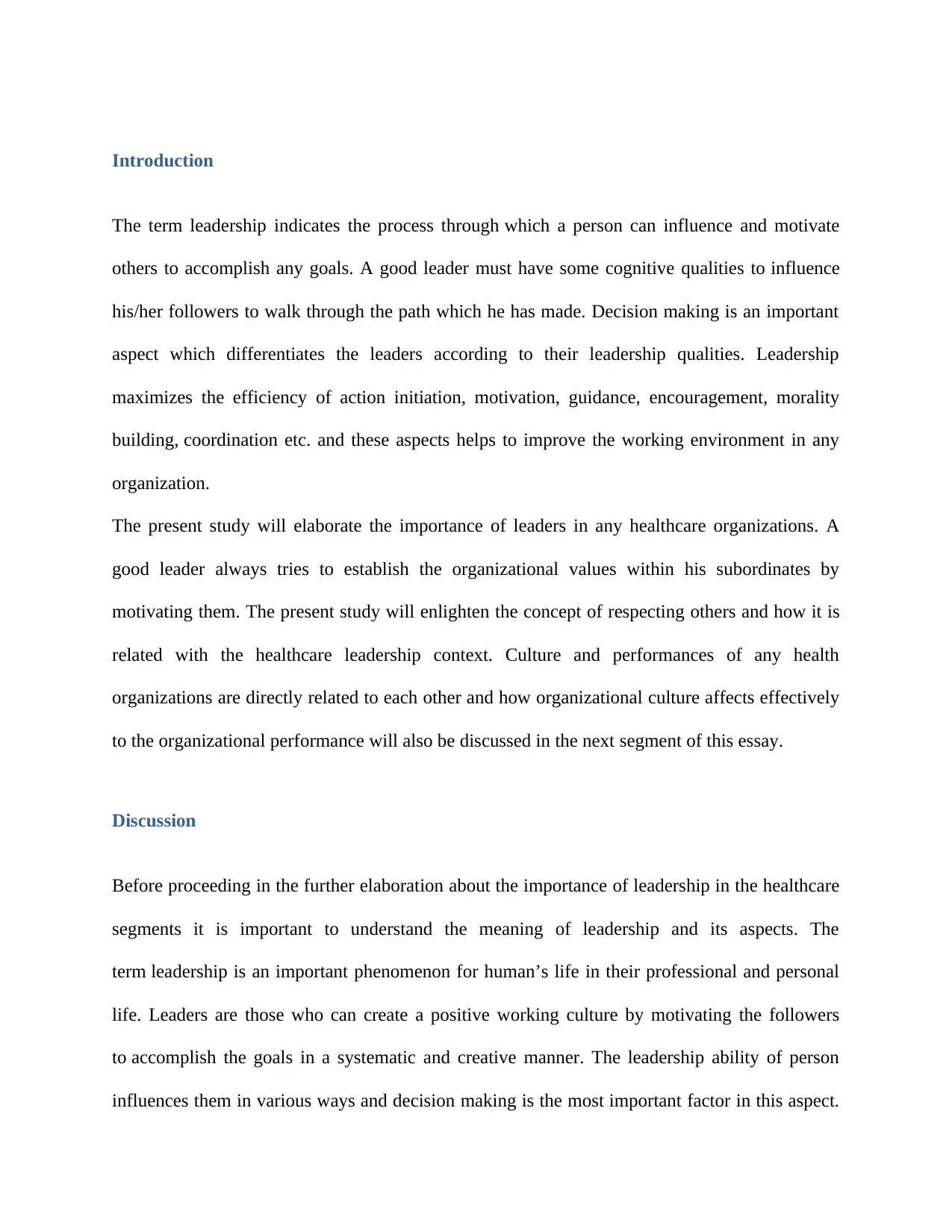
Introduction
The term leadership indicates the process through which a person can influence and motivate
others to accomplish any goals. A good leader must have some cognitive qualities to influence
his/her followers to walk through the path which he has made. Decision making is an important
aspect which differentiates the leaders according to their leadership qualities. Leadership
maximizes the efficiency of action initiation, motivation, guidance, encouragement, morality
building, coordination etc. and these aspects helps to improve the working environment in any
organization.
The present study will elaborate the importance of leaders in any healthcare organizations. A
good leader always tries to establish the organizational values within his subordinates by
motivating them. The present study will enlighten the concept of respecting others and how it is
related with the healthcare leadership context. Culture and performances of any health
organizations are directly related to each other and how organizational culture affects effectively
to the organizational performance will also be discussed in the next segment of this essay.
Discussion
Before proceeding in the further elaboration about the importance of leadership in the healthcare
segments it is important to understand the meaning of leadership and its aspects. The
term leadership is an important phenomenon for human’s life in their professional and personal
life. Leaders are those who can create a positive working culture by motivating the followers
to accomplish the goals in a systematic and creative manner. The leadership ability of person
influences them in various ways and decision making is the most important factor in this aspect.
The term leadership indicates the process through which a person can influence and motivate
others to accomplish any goals. A good leader must have some cognitive qualities to influence
his/her followers to walk through the path which he has made. Decision making is an important
aspect which differentiates the leaders according to their leadership qualities. Leadership
maximizes the efficiency of action initiation, motivation, guidance, encouragement, morality
building, coordination etc. and these aspects helps to improve the working environment in any
organization.
The present study will elaborate the importance of leaders in any healthcare organizations. A
good leader always tries to establish the organizational values within his subordinates by
motivating them. The present study will enlighten the concept of respecting others and how it is
related with the healthcare leadership context. Culture and performances of any health
organizations are directly related to each other and how organizational culture affects effectively
to the organizational performance will also be discussed in the next segment of this essay.
Discussion
Before proceeding in the further elaboration about the importance of leadership in the healthcare
segments it is important to understand the meaning of leadership and its aspects. The
term leadership is an important phenomenon for human’s life in their professional and personal
life. Leaders are those who can create a positive working culture by motivating the followers
to accomplish the goals in a systematic and creative manner. The leadership ability of person
influences them in various ways and decision making is the most important factor in this aspect.
⊘ This is a preview!⊘
Do you want full access?
Subscribe today to unlock all pages.

Trusted by 1+ million students worldwide
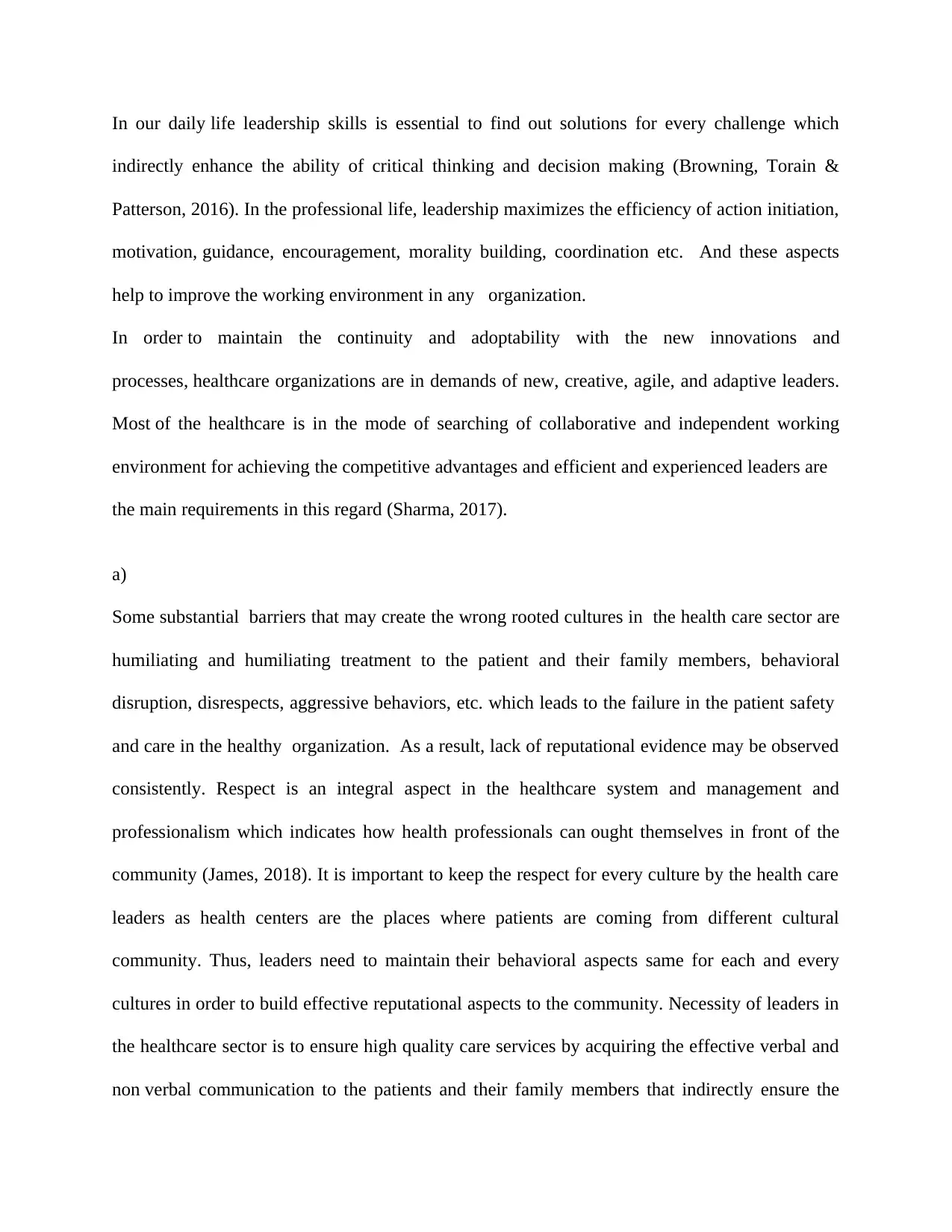
In our daily life leadership skills is essential to find out solutions for every challenge which
indirectly enhance the ability of critical thinking and decision making (Browning, Torain &
Patterson, 2016). In the professional life, leadership maximizes the efficiency of action initiation,
motivation, guidance, encouragement, morality building, coordination etc. And these aspects
help to improve the working environment in any organization.
In order to maintain the continuity and adoptability with the new innovations and
processes, healthcare organizations are in demands of new, creative, agile, and adaptive leaders.
Most of the healthcare is in the mode of searching of collaborative and independent working
environment for achieving the competitive advantages and efficient and experienced leaders are
the main requirements in this regard (Sharma, 2017).
a)
Some substantial barriers that may create the wrong rooted cultures in the health care sector are
humiliating and humiliating treatment to the patient and their family members, behavioral
disruption, disrespects, aggressive behaviors, etc. which leads to the failure in the patient safety
and care in the healthy organization. As a result, lack of reputational evidence may be observed
consistently. Respect is an integral aspect in the healthcare system and management and
professionalism which indicates how health professionals can ought themselves in front of the
community (James, 2018). It is important to keep the respect for every culture by the health care
leaders as health centers are the places where patients are coming from different cultural
community. Thus, leaders need to maintain their behavioral aspects same for each and every
cultures in order to build effective reputational aspects to the community. Necessity of leaders in
the healthcare sector is to ensure high quality care services by acquiring the effective verbal and
non verbal communication to the patients and their family members that indirectly ensure the
indirectly enhance the ability of critical thinking and decision making (Browning, Torain &
Patterson, 2016). In the professional life, leadership maximizes the efficiency of action initiation,
motivation, guidance, encouragement, morality building, coordination etc. And these aspects
help to improve the working environment in any organization.
In order to maintain the continuity and adoptability with the new innovations and
processes, healthcare organizations are in demands of new, creative, agile, and adaptive leaders.
Most of the healthcare is in the mode of searching of collaborative and independent working
environment for achieving the competitive advantages and efficient and experienced leaders are
the main requirements in this regard (Sharma, 2017).
a)
Some substantial barriers that may create the wrong rooted cultures in the health care sector are
humiliating and humiliating treatment to the patient and their family members, behavioral
disruption, disrespects, aggressive behaviors, etc. which leads to the failure in the patient safety
and care in the healthy organization. As a result, lack of reputational evidence may be observed
consistently. Respect is an integral aspect in the healthcare system and management and
professionalism which indicates how health professionals can ought themselves in front of the
community (James, 2018). It is important to keep the respect for every culture by the health care
leaders as health centers are the places where patients are coming from different cultural
community. Thus, leaders need to maintain their behavioral aspects same for each and every
cultures in order to build effective reputational aspects to the community. Necessity of leaders in
the healthcare sector is to ensure high quality care services by acquiring the effective verbal and
non verbal communication to the patients and their family members that indirectly ensure the
Paraphrase This Document
Need a fresh take? Get an instant paraphrase of this document with our AI Paraphraser
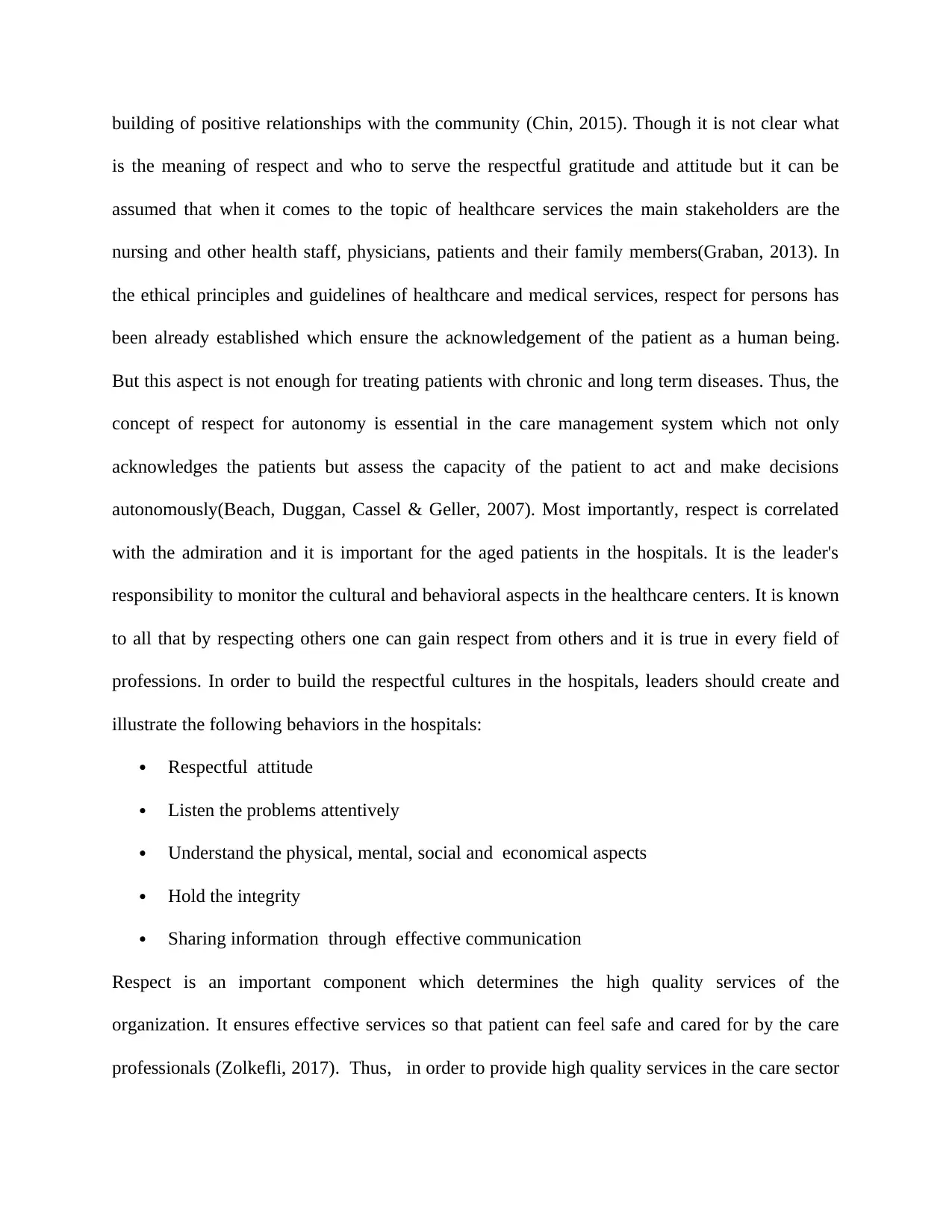
building of positive relationships with the community (Chin, 2015). Though it is not clear what
is the meaning of respect and who to serve the respectful gratitude and attitude but it can be
assumed that when it comes to the topic of healthcare services the main stakeholders are the
nursing and other health staff, physicians, patients and their family members(Graban, 2013). In
the ethical principles and guidelines of healthcare and medical services, respect for persons has
been already established which ensure the acknowledgement of the patient as a human being.
But this aspect is not enough for treating patients with chronic and long term diseases. Thus, the
concept of respect for autonomy is essential in the care management system which not only
acknowledges the patients but assess the capacity of the patient to act and make decisions
autonomously(Beach, Duggan, Cassel & Geller, 2007). Most importantly, respect is correlated
with the admiration and it is important for the aged patients in the hospitals. It is the leader's
responsibility to monitor the cultural and behavioral aspects in the healthcare centers. It is known
to all that by respecting others one can gain respect from others and it is true in every field of
professions. In order to build the respectful cultures in the hospitals, leaders should create and
illustrate the following behaviors in the hospitals:
Respectful attitude
Listen the problems attentively
Understand the physical, mental, social and economical aspects
Hold the integrity
Sharing information through effective communication
Respect is an important component which determines the high quality services of the
organization. It ensures effective services so that patient can feel safe and cared for by the care
professionals (Zolkefli, 2017). Thus, in order to provide high quality services in the care sector
is the meaning of respect and who to serve the respectful gratitude and attitude but it can be
assumed that when it comes to the topic of healthcare services the main stakeholders are the
nursing and other health staff, physicians, patients and their family members(Graban, 2013). In
the ethical principles and guidelines of healthcare and medical services, respect for persons has
been already established which ensure the acknowledgement of the patient as a human being.
But this aspect is not enough for treating patients with chronic and long term diseases. Thus, the
concept of respect for autonomy is essential in the care management system which not only
acknowledges the patients but assess the capacity of the patient to act and make decisions
autonomously(Beach, Duggan, Cassel & Geller, 2007). Most importantly, respect is correlated
with the admiration and it is important for the aged patients in the hospitals. It is the leader's
responsibility to monitor the cultural and behavioral aspects in the healthcare centers. It is known
to all that by respecting others one can gain respect from others and it is true in every field of
professions. In order to build the respectful cultures in the hospitals, leaders should create and
illustrate the following behaviors in the hospitals:
Respectful attitude
Listen the problems attentively
Understand the physical, mental, social and economical aspects
Hold the integrity
Sharing information through effective communication
Respect is an important component which determines the high quality services of the
organization. It ensures effective services so that patient can feel safe and cared for by the care
professionals (Zolkefli, 2017). Thus, in order to provide high quality services in the care sector
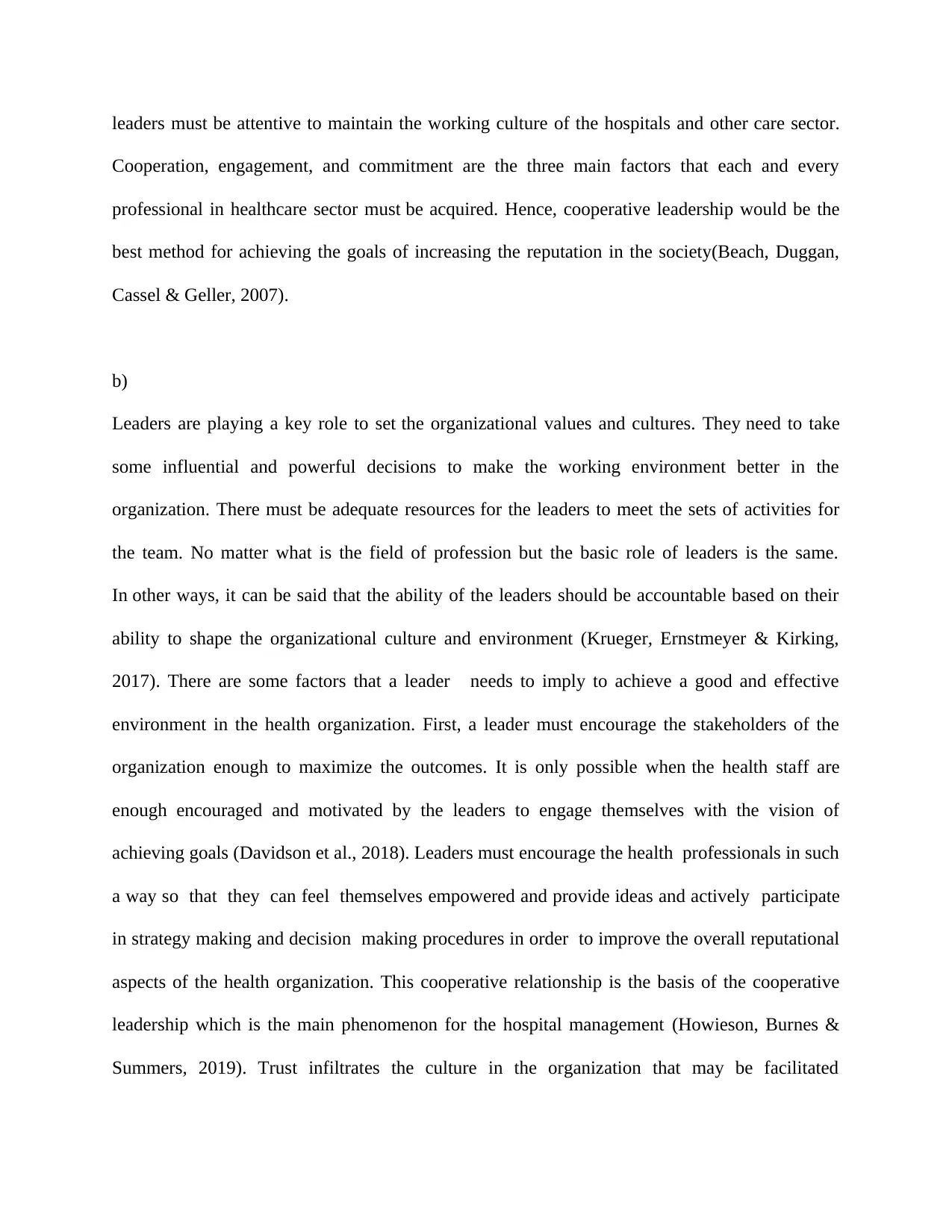
leaders must be attentive to maintain the working culture of the hospitals and other care sector.
Cooperation, engagement, and commitment are the three main factors that each and every
professional in healthcare sector must be acquired. Hence, cooperative leadership would be the
best method for achieving the goals of increasing the reputation in the society(Beach, Duggan,
Cassel & Geller, 2007).
b)
Leaders are playing a key role to set the organizational values and cultures. They need to take
some influential and powerful decisions to make the working environment better in the
organization. There must be adequate resources for the leaders to meet the sets of activities for
the team. No matter what is the field of profession but the basic role of leaders is the same.
In other ways, it can be said that the ability of the leaders should be accountable based on their
ability to shape the organizational culture and environment (Krueger, Ernstmeyer & Kirking,
2017). There are some factors that a leader needs to imply to achieve a good and effective
environment in the health organization. First, a leader must encourage the stakeholders of the
organization enough to maximize the outcomes. It is only possible when the health staff are
enough encouraged and motivated by the leaders to engage themselves with the vision of
achieving goals (Davidson et al., 2018). Leaders must encourage the health professionals in such
a way so that they can feel themselves empowered and provide ideas and actively participate
in strategy making and decision making procedures in order to improve the overall reputational
aspects of the health organization. This cooperative relationship is the basis of the cooperative
leadership which is the main phenomenon for the hospital management (Howieson, Burnes &
Summers, 2019). Trust infiltrates the culture in the organization that may be facilitated
Cooperation, engagement, and commitment are the three main factors that each and every
professional in healthcare sector must be acquired. Hence, cooperative leadership would be the
best method for achieving the goals of increasing the reputation in the society(Beach, Duggan,
Cassel & Geller, 2007).
b)
Leaders are playing a key role to set the organizational values and cultures. They need to take
some influential and powerful decisions to make the working environment better in the
organization. There must be adequate resources for the leaders to meet the sets of activities for
the team. No matter what is the field of profession but the basic role of leaders is the same.
In other ways, it can be said that the ability of the leaders should be accountable based on their
ability to shape the organizational culture and environment (Krueger, Ernstmeyer & Kirking,
2017). There are some factors that a leader needs to imply to achieve a good and effective
environment in the health organization. First, a leader must encourage the stakeholders of the
organization enough to maximize the outcomes. It is only possible when the health staff are
enough encouraged and motivated by the leaders to engage themselves with the vision of
achieving goals (Davidson et al., 2018). Leaders must encourage the health professionals in such
a way so that they can feel themselves empowered and provide ideas and actively participate
in strategy making and decision making procedures in order to improve the overall reputational
aspects of the health organization. This cooperative relationship is the basis of the cooperative
leadership which is the main phenomenon for the hospital management (Howieson, Burnes &
Summers, 2019). Trust infiltrates the culture in the organization that may be facilitated
⊘ This is a preview!⊘
Do you want full access?
Subscribe today to unlock all pages.

Trusted by 1+ million students worldwide
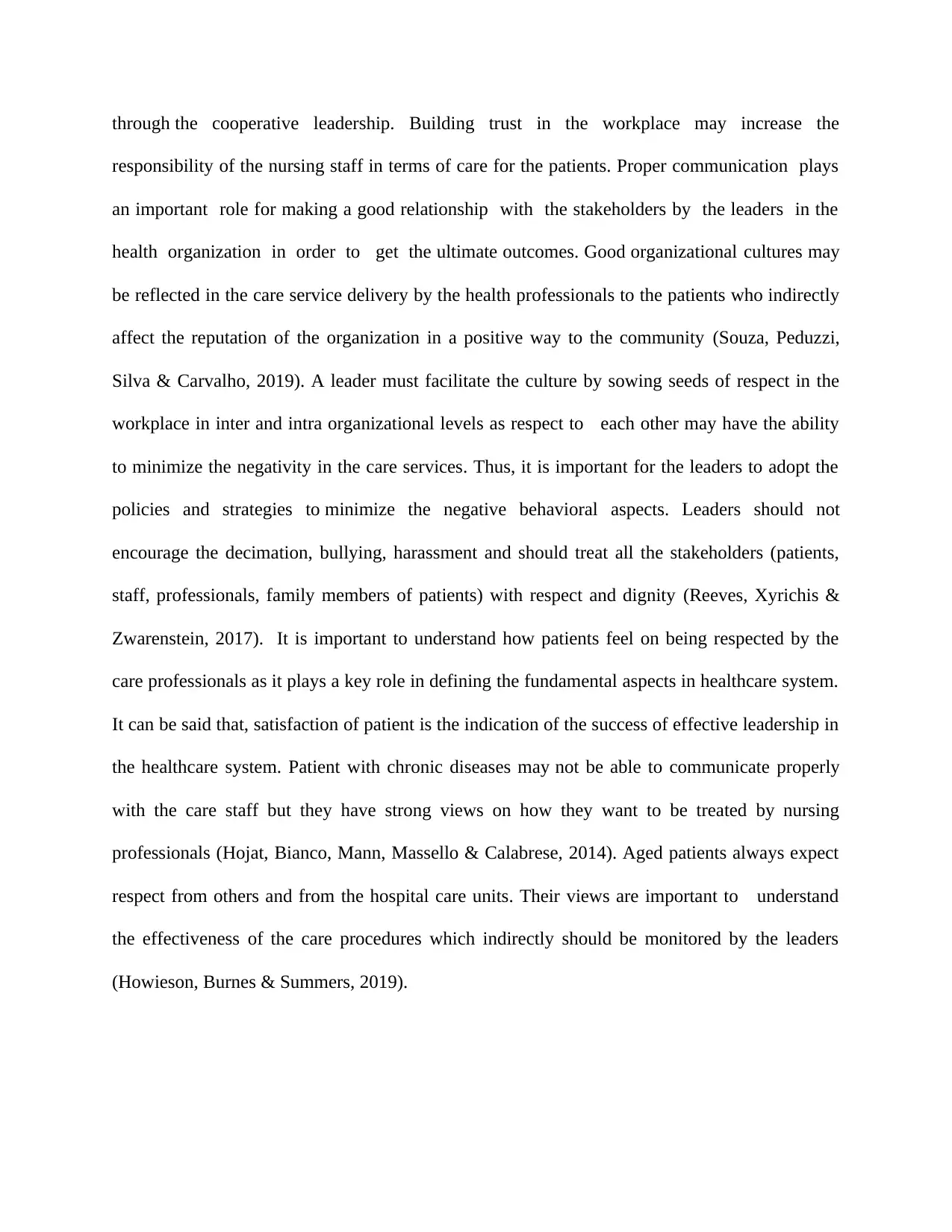
through the cooperative leadership. Building trust in the workplace may increase the
responsibility of the nursing staff in terms of care for the patients. Proper communication plays
an important role for making a good relationship with the stakeholders by the leaders in the
health organization in order to get the ultimate outcomes. Good organizational cultures may
be reflected in the care service delivery by the health professionals to the patients who indirectly
affect the reputation of the organization in a positive way to the community (Souza, Peduzzi,
Silva & Carvalho, 2019). A leader must facilitate the culture by sowing seeds of respect in the
workplace in inter and intra organizational levels as respect to each other may have the ability
to minimize the negativity in the care services. Thus, it is important for the leaders to adopt the
policies and strategies to minimize the negative behavioral aspects. Leaders should not
encourage the decimation, bullying, harassment and should treat all the stakeholders (patients,
staff, professionals, family members of patients) with respect and dignity (Reeves, Xyrichis &
Zwarenstein, 2017). It is important to understand how patients feel on being respected by the
care professionals as it plays a key role in defining the fundamental aspects in healthcare system.
It can be said that, satisfaction of patient is the indication of the success of effective leadership in
the healthcare system. Patient with chronic diseases may not be able to communicate properly
with the care staff but they have strong views on how they want to be treated by nursing
professionals (Hojat, Bianco, Mann, Massello & Calabrese, 2014). Aged patients always expect
respect from others and from the hospital care units. Their views are important to understand
the effectiveness of the care procedures which indirectly should be monitored by the leaders
(Howieson, Burnes & Summers, 2019).
responsibility of the nursing staff in terms of care for the patients. Proper communication plays
an important role for making a good relationship with the stakeholders by the leaders in the
health organization in order to get the ultimate outcomes. Good organizational cultures may
be reflected in the care service delivery by the health professionals to the patients who indirectly
affect the reputation of the organization in a positive way to the community (Souza, Peduzzi,
Silva & Carvalho, 2019). A leader must facilitate the culture by sowing seeds of respect in the
workplace in inter and intra organizational levels as respect to each other may have the ability
to minimize the negativity in the care services. Thus, it is important for the leaders to adopt the
policies and strategies to minimize the negative behavioral aspects. Leaders should not
encourage the decimation, bullying, harassment and should treat all the stakeholders (patients,
staff, professionals, family members of patients) with respect and dignity (Reeves, Xyrichis &
Zwarenstein, 2017). It is important to understand how patients feel on being respected by the
care professionals as it plays a key role in defining the fundamental aspects in healthcare system.
It can be said that, satisfaction of patient is the indication of the success of effective leadership in
the healthcare system. Patient with chronic diseases may not be able to communicate properly
with the care staff but they have strong views on how they want to be treated by nursing
professionals (Hojat, Bianco, Mann, Massello & Calabrese, 2014). Aged patients always expect
respect from others and from the hospital care units. Their views are important to understand
the effectiveness of the care procedures which indirectly should be monitored by the leaders
(Howieson, Burnes & Summers, 2019).
Paraphrase This Document
Need a fresh take? Get an instant paraphrase of this document with our AI Paraphraser
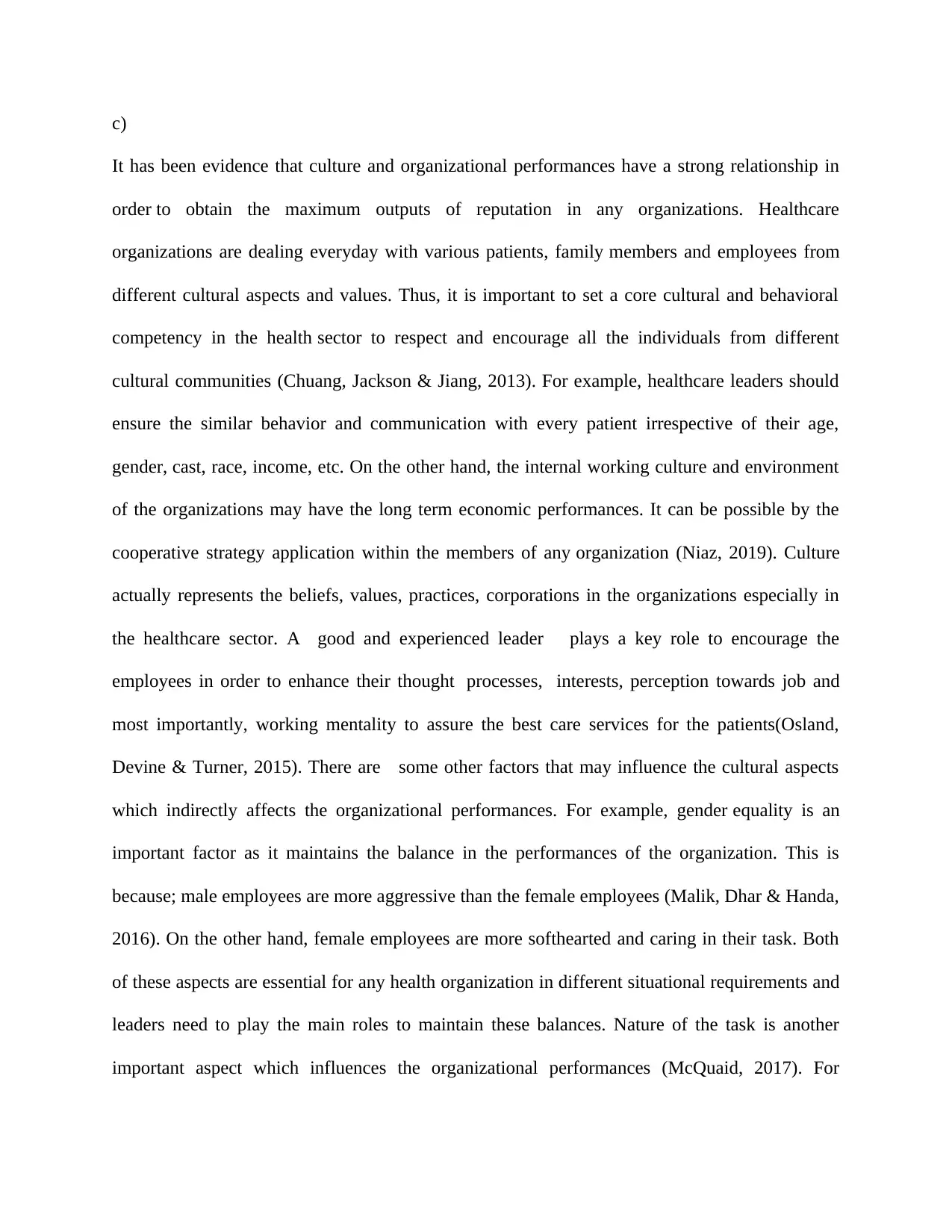
c)
It has been evidence that culture and organizational performances have a strong relationship in
order to obtain the maximum outputs of reputation in any organizations. Healthcare
organizations are dealing everyday with various patients, family members and employees from
different cultural aspects and values. Thus, it is important to set a core cultural and behavioral
competency in the health sector to respect and encourage all the individuals from different
cultural communities (Chuang, Jackson & Jiang, 2013). For example, healthcare leaders should
ensure the similar behavior and communication with every patient irrespective of their age,
gender, cast, race, income, etc. On the other hand, the internal working culture and environment
of the organizations may have the long term economic performances. It can be possible by the
cooperative strategy application within the members of any organization (Niaz, 2019). Culture
actually represents the beliefs, values, practices, corporations in the organizations especially in
the healthcare sector. A good and experienced leader plays a key role to encourage the
employees in order to enhance their thought processes, interests, perception towards job and
most importantly, working mentality to assure the best care services for the patients(Osland,
Devine & Turner, 2015). There are some other factors that may influence the cultural aspects
which indirectly affects the organizational performances. For example, gender equality is an
important factor as it maintains the balance in the performances of the organization. This is
because; male employees are more aggressive than the female employees (Malik, Dhar & Handa,
2016). On the other hand, female employees are more softhearted and caring in their task. Both
of these aspects are essential for any health organization in different situational requirements and
leaders need to play the main roles to maintain these balances. Nature of the task is another
important aspect which influences the organizational performances (McQuaid, 2017). For
It has been evidence that culture and organizational performances have a strong relationship in
order to obtain the maximum outputs of reputation in any organizations. Healthcare
organizations are dealing everyday with various patients, family members and employees from
different cultural aspects and values. Thus, it is important to set a core cultural and behavioral
competency in the health sector to respect and encourage all the individuals from different
cultural communities (Chuang, Jackson & Jiang, 2013). For example, healthcare leaders should
ensure the similar behavior and communication with every patient irrespective of their age,
gender, cast, race, income, etc. On the other hand, the internal working culture and environment
of the organizations may have the long term economic performances. It can be possible by the
cooperative strategy application within the members of any organization (Niaz, 2019). Culture
actually represents the beliefs, values, practices, corporations in the organizations especially in
the healthcare sector. A good and experienced leader plays a key role to encourage the
employees in order to enhance their thought processes, interests, perception towards job and
most importantly, working mentality to assure the best care services for the patients(Osland,
Devine & Turner, 2015). There are some other factors that may influence the cultural aspects
which indirectly affects the organizational performances. For example, gender equality is an
important factor as it maintains the balance in the performances of the organization. This is
because; male employees are more aggressive than the female employees (Malik, Dhar & Handa,
2016). On the other hand, female employees are more softhearted and caring in their task. Both
of these aspects are essential for any health organization in different situational requirements and
leaders need to play the main roles to maintain these balances. Nature of the task is another
important aspect which influences the organizational performances (McQuaid, 2017). For
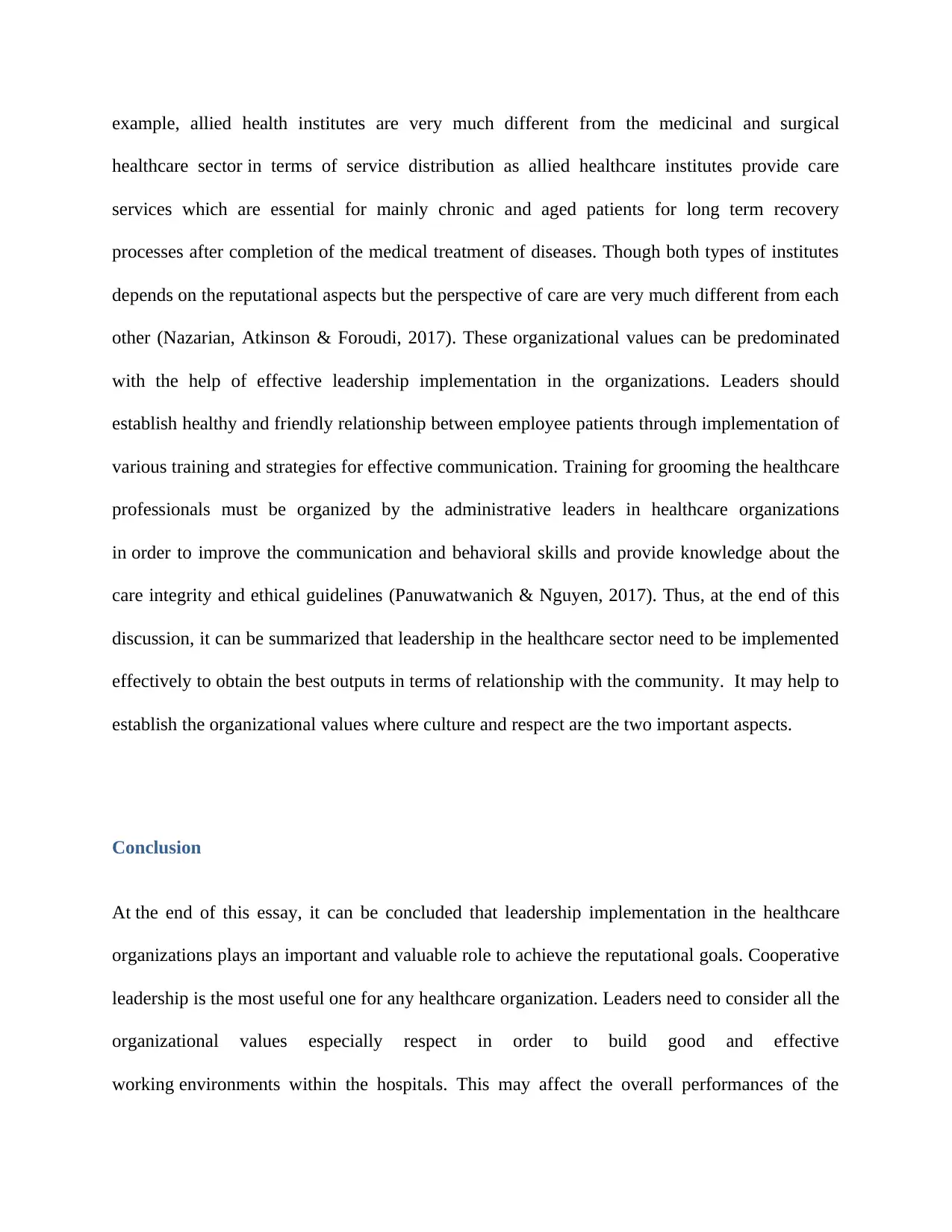
example, allied health institutes are very much different from the medicinal and surgical
healthcare sector in terms of service distribution as allied healthcare institutes provide care
services which are essential for mainly chronic and aged patients for long term recovery
processes after completion of the medical treatment of diseases. Though both types of institutes
depends on the reputational aspects but the perspective of care are very much different from each
other (Nazarian, Atkinson & Foroudi, 2017). These organizational values can be predominated
with the help of effective leadership implementation in the organizations. Leaders should
establish healthy and friendly relationship between employee patients through implementation of
various training and strategies for effective communication. Training for grooming the healthcare
professionals must be organized by the administrative leaders in healthcare organizations
in order to improve the communication and behavioral skills and provide knowledge about the
care integrity and ethical guidelines (Panuwatwanich & Nguyen, 2017). Thus, at the end of this
discussion, it can be summarized that leadership in the healthcare sector need to be implemented
effectively to obtain the best outputs in terms of relationship with the community. It may help to
establish the organizational values where culture and respect are the two important aspects.
Conclusion
At the end of this essay, it can be concluded that leadership implementation in the healthcare
organizations plays an important and valuable role to achieve the reputational goals. Cooperative
leadership is the most useful one for any healthcare organization. Leaders need to consider all the
organizational values especially respect in order to build good and effective
working environments within the hospitals. This may affect the overall performances of the
healthcare sector in terms of service distribution as allied healthcare institutes provide care
services which are essential for mainly chronic and aged patients for long term recovery
processes after completion of the medical treatment of diseases. Though both types of institutes
depends on the reputational aspects but the perspective of care are very much different from each
other (Nazarian, Atkinson & Foroudi, 2017). These organizational values can be predominated
with the help of effective leadership implementation in the organizations. Leaders should
establish healthy and friendly relationship between employee patients through implementation of
various training and strategies for effective communication. Training for grooming the healthcare
professionals must be organized by the administrative leaders in healthcare organizations
in order to improve the communication and behavioral skills and provide knowledge about the
care integrity and ethical guidelines (Panuwatwanich & Nguyen, 2017). Thus, at the end of this
discussion, it can be summarized that leadership in the healthcare sector need to be implemented
effectively to obtain the best outputs in terms of relationship with the community. It may help to
establish the organizational values where culture and respect are the two important aspects.
Conclusion
At the end of this essay, it can be concluded that leadership implementation in the healthcare
organizations plays an important and valuable role to achieve the reputational goals. Cooperative
leadership is the most useful one for any healthcare organization. Leaders need to consider all the
organizational values especially respect in order to build good and effective
working environments within the hospitals. This may affect the overall performances of the
⊘ This is a preview!⊘
Do you want full access?
Subscribe today to unlock all pages.

Trusted by 1+ million students worldwide
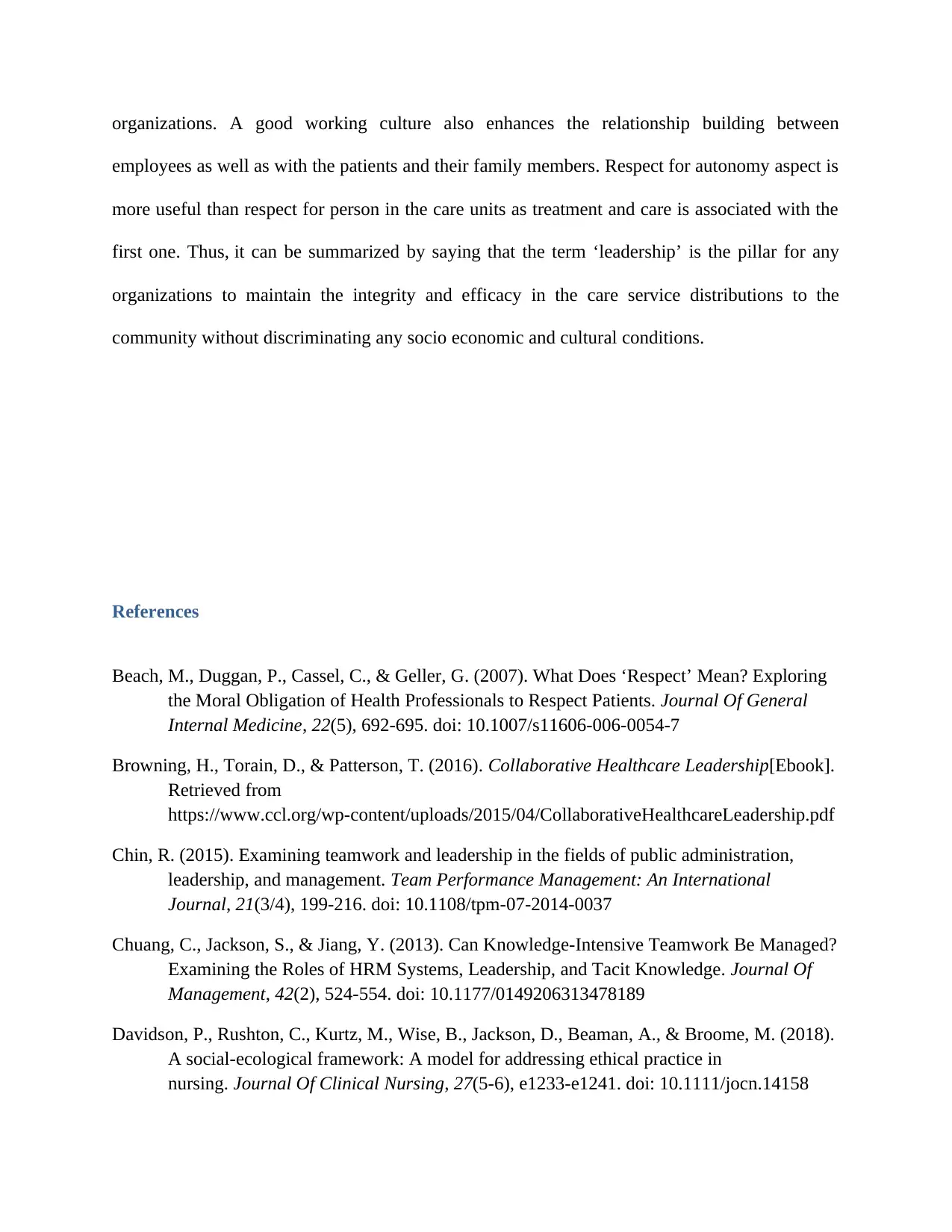
organizations. A good working culture also enhances the relationship building between
employees as well as with the patients and their family members. Respect for autonomy aspect is
more useful than respect for person in the care units as treatment and care is associated with the
first one. Thus, it can be summarized by saying that the term ‘leadership’ is the pillar for any
organizations to maintain the integrity and efficacy in the care service distributions to the
community without discriminating any socio economic and cultural conditions.
References
Beach, M., Duggan, P., Cassel, C., & Geller, G. (2007). What Does ‘Respect’ Mean? Exploring
the Moral Obligation of Health Professionals to Respect Patients. Journal Of General
Internal Medicine, 22(5), 692-695. doi: 10.1007/s11606-006-0054-7
Browning, H., Torain, D., & Patterson, T. (2016). Collaborative Healthcare Leadership[Ebook].
Retrieved from
https://www.ccl.org/wp-content/uploads/2015/04/CollaborativeHealthcareLeadership.pdf
Chin, R. (2015). Examining teamwork and leadership in the fields of public administration,
leadership, and management. Team Performance Management: An International
Journal, 21(3/4), 199-216. doi: 10.1108/tpm-07-2014-0037
Chuang, C., Jackson, S., & Jiang, Y. (2013). Can Knowledge-Intensive Teamwork Be Managed?
Examining the Roles of HRM Systems, Leadership, and Tacit Knowledge. Journal Of
Management, 42(2), 524-554. doi: 10.1177/0149206313478189
Davidson, P., Rushton, C., Kurtz, M., Wise, B., Jackson, D., Beaman, A., & Broome, M. (2018).
A social-ecological framework: A model for addressing ethical practice in
nursing. Journal Of Clinical Nursing, 27(5-6), e1233-e1241. doi: 10.1111/jocn.14158
employees as well as with the patients and their family members. Respect for autonomy aspect is
more useful than respect for person in the care units as treatment and care is associated with the
first one. Thus, it can be summarized by saying that the term ‘leadership’ is the pillar for any
organizations to maintain the integrity and efficacy in the care service distributions to the
community without discriminating any socio economic and cultural conditions.
References
Beach, M., Duggan, P., Cassel, C., & Geller, G. (2007). What Does ‘Respect’ Mean? Exploring
the Moral Obligation of Health Professionals to Respect Patients. Journal Of General
Internal Medicine, 22(5), 692-695. doi: 10.1007/s11606-006-0054-7
Browning, H., Torain, D., & Patterson, T. (2016). Collaborative Healthcare Leadership[Ebook].
Retrieved from
https://www.ccl.org/wp-content/uploads/2015/04/CollaborativeHealthcareLeadership.pdf
Chin, R. (2015). Examining teamwork and leadership in the fields of public administration,
leadership, and management. Team Performance Management: An International
Journal, 21(3/4), 199-216. doi: 10.1108/tpm-07-2014-0037
Chuang, C., Jackson, S., & Jiang, Y. (2013). Can Knowledge-Intensive Teamwork Be Managed?
Examining the Roles of HRM Systems, Leadership, and Tacit Knowledge. Journal Of
Management, 42(2), 524-554. doi: 10.1177/0149206313478189
Davidson, P., Rushton, C., Kurtz, M., Wise, B., Jackson, D., Beaman, A., & Broome, M. (2018).
A social-ecological framework: A model for addressing ethical practice in
nursing. Journal Of Clinical Nursing, 27(5-6), e1233-e1241. doi: 10.1111/jocn.14158
Paraphrase This Document
Need a fresh take? Get an instant paraphrase of this document with our AI Paraphraser
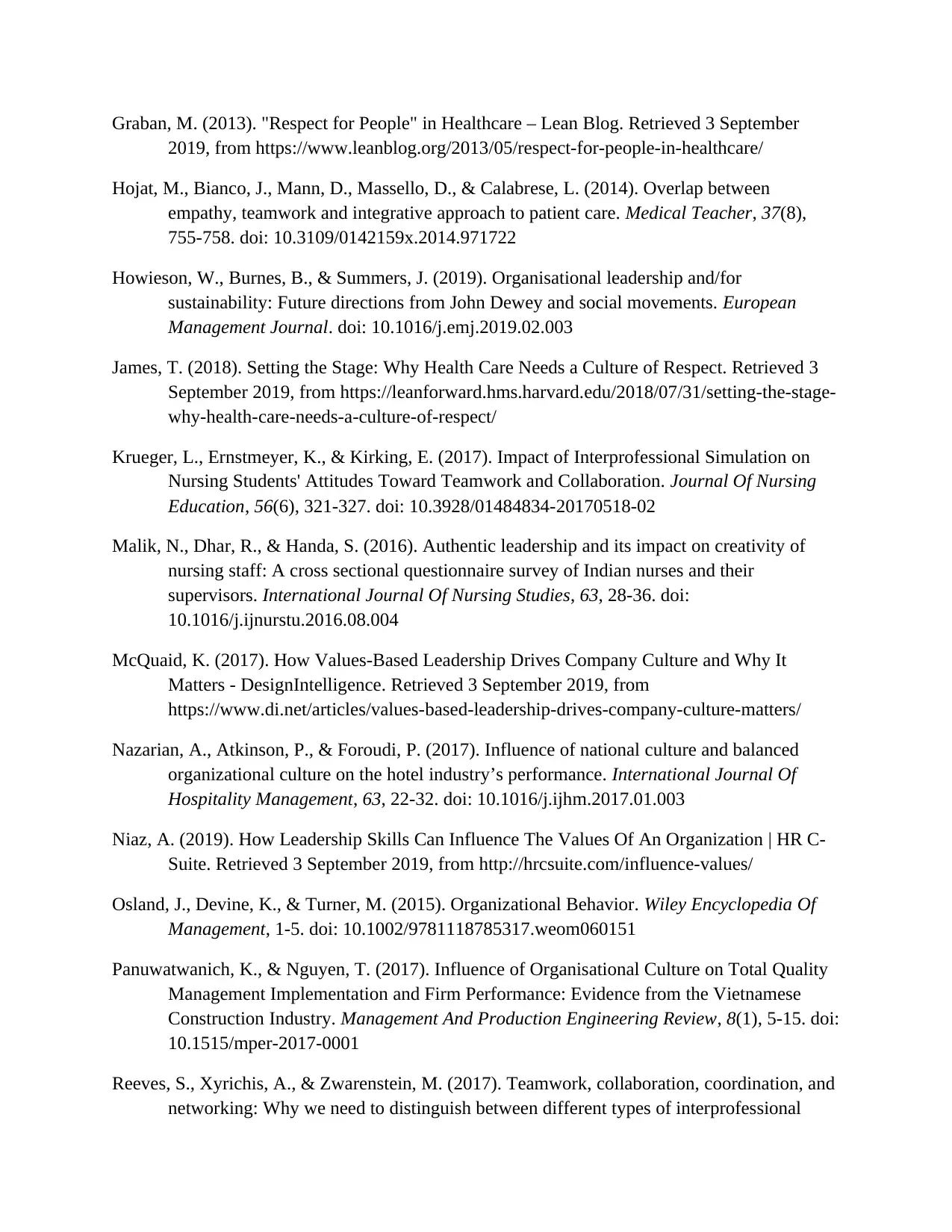
Graban, M. (2013). "Respect for People" in Healthcare – Lean Blog. Retrieved 3 September
2019, from https://www.leanblog.org/2013/05/respect-for-people-in-healthcare/
Hojat, M., Bianco, J., Mann, D., Massello, D., & Calabrese, L. (2014). Overlap between
empathy, teamwork and integrative approach to patient care. Medical Teacher, 37(8),
755-758. doi: 10.3109/0142159x.2014.971722
Howieson, W., Burnes, B., & Summers, J. (2019). Organisational leadership and/for
sustainability: Future directions from John Dewey and social movements. European
Management Journal. doi: 10.1016/j.emj.2019.02.003
James, T. (2018). Setting the Stage: Why Health Care Needs a Culture of Respect. Retrieved 3
September 2019, from https://leanforward.hms.harvard.edu/2018/07/31/setting-the-stage-
why-health-care-needs-a-culture-of-respect/
Krueger, L., Ernstmeyer, K., & Kirking, E. (2017). Impact of Interprofessional Simulation on
Nursing Students' Attitudes Toward Teamwork and Collaboration. Journal Of Nursing
Education, 56(6), 321-327. doi: 10.3928/01484834-20170518-02
Malik, N., Dhar, R., & Handa, S. (2016). Authentic leadership and its impact on creativity of
nursing staff: A cross sectional questionnaire survey of Indian nurses and their
supervisors. International Journal Of Nursing Studies, 63, 28-36. doi:
10.1016/j.ijnurstu.2016.08.004
McQuaid, K. (2017). How Values-Based Leadership Drives Company Culture and Why It
Matters - DesignIntelligence. Retrieved 3 September 2019, from
https://www.di.net/articles/values-based-leadership-drives-company-culture-matters/
Nazarian, A., Atkinson, P., & Foroudi, P. (2017). Influence of national culture and balanced
organizational culture on the hotel industry’s performance. International Journal Of
Hospitality Management, 63, 22-32. doi: 10.1016/j.ijhm.2017.01.003
Niaz, A. (2019). How Leadership Skills Can Influence The Values Of An Organization | HR C-
Suite. Retrieved 3 September 2019, from http://hrcsuite.com/influence-values/
Osland, J., Devine, K., & Turner, M. (2015). Organizational Behavior. Wiley Encyclopedia Of
Management, 1-5. doi: 10.1002/9781118785317.weom060151
Panuwatwanich, K., & Nguyen, T. (2017). Influence of Organisational Culture on Total Quality
Management Implementation and Firm Performance: Evidence from the Vietnamese
Construction Industry. Management And Production Engineering Review, 8(1), 5-15. doi:
10.1515/mper-2017-0001
Reeves, S., Xyrichis, A., & Zwarenstein, M. (2017). Teamwork, collaboration, coordination, and
networking: Why we need to distinguish between different types of interprofessional
2019, from https://www.leanblog.org/2013/05/respect-for-people-in-healthcare/
Hojat, M., Bianco, J., Mann, D., Massello, D., & Calabrese, L. (2014). Overlap between
empathy, teamwork and integrative approach to patient care. Medical Teacher, 37(8),
755-758. doi: 10.3109/0142159x.2014.971722
Howieson, W., Burnes, B., & Summers, J. (2019). Organisational leadership and/for
sustainability: Future directions from John Dewey and social movements. European
Management Journal. doi: 10.1016/j.emj.2019.02.003
James, T. (2018). Setting the Stage: Why Health Care Needs a Culture of Respect. Retrieved 3
September 2019, from https://leanforward.hms.harvard.edu/2018/07/31/setting-the-stage-
why-health-care-needs-a-culture-of-respect/
Krueger, L., Ernstmeyer, K., & Kirking, E. (2017). Impact of Interprofessional Simulation on
Nursing Students' Attitudes Toward Teamwork and Collaboration. Journal Of Nursing
Education, 56(6), 321-327. doi: 10.3928/01484834-20170518-02
Malik, N., Dhar, R., & Handa, S. (2016). Authentic leadership and its impact on creativity of
nursing staff: A cross sectional questionnaire survey of Indian nurses and their
supervisors. International Journal Of Nursing Studies, 63, 28-36. doi:
10.1016/j.ijnurstu.2016.08.004
McQuaid, K. (2017). How Values-Based Leadership Drives Company Culture and Why It
Matters - DesignIntelligence. Retrieved 3 September 2019, from
https://www.di.net/articles/values-based-leadership-drives-company-culture-matters/
Nazarian, A., Atkinson, P., & Foroudi, P. (2017). Influence of national culture and balanced
organizational culture on the hotel industry’s performance. International Journal Of
Hospitality Management, 63, 22-32. doi: 10.1016/j.ijhm.2017.01.003
Niaz, A. (2019). How Leadership Skills Can Influence The Values Of An Organization | HR C-
Suite. Retrieved 3 September 2019, from http://hrcsuite.com/influence-values/
Osland, J., Devine, K., & Turner, M. (2015). Organizational Behavior. Wiley Encyclopedia Of
Management, 1-5. doi: 10.1002/9781118785317.weom060151
Panuwatwanich, K., & Nguyen, T. (2017). Influence of Organisational Culture on Total Quality
Management Implementation and Firm Performance: Evidence from the Vietnamese
Construction Industry. Management And Production Engineering Review, 8(1), 5-15. doi:
10.1515/mper-2017-0001
Reeves, S., Xyrichis, A., & Zwarenstein, M. (2017). Teamwork, collaboration, coordination, and
networking: Why we need to distinguish between different types of interprofessional
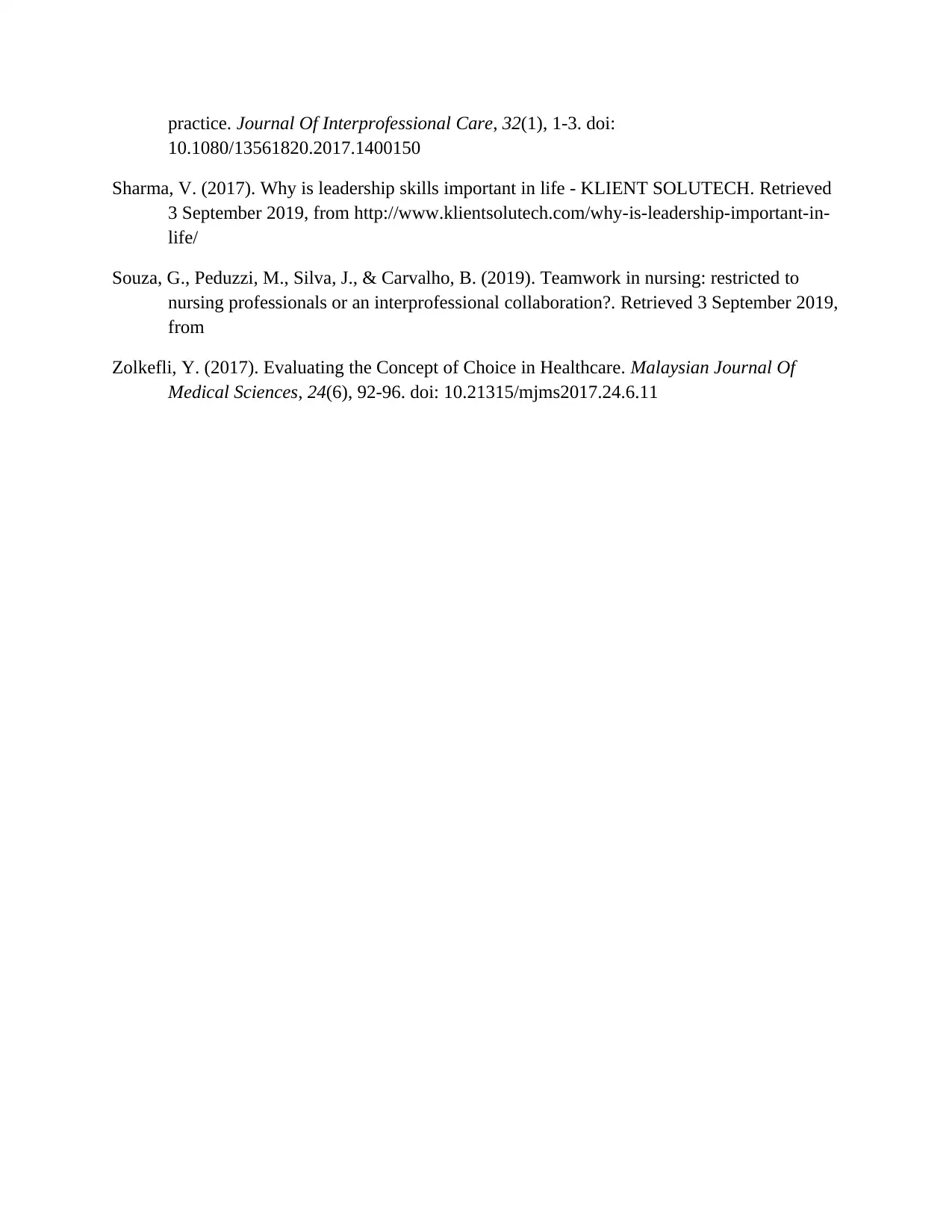
practice. Journal Of Interprofessional Care, 32(1), 1-3. doi:
10.1080/13561820.2017.1400150
Sharma, V. (2017). Why is leadership skills important in life - KLIENT SOLUTECH. Retrieved
3 September 2019, from http://www.klientsolutech.com/why-is-leadership-important-in-
life/
Souza, G., Peduzzi, M., Silva, J., & Carvalho, B. (2019). Teamwork in nursing: restricted to
nursing professionals or an interprofessional collaboration?. Retrieved 3 September 2019,
from
Zolkefli, Y. (2017). Evaluating the Concept of Choice in Healthcare. Malaysian Journal Of
Medical Sciences, 24(6), 92-96. doi: 10.21315/mjms2017.24.6.11
10.1080/13561820.2017.1400150
Sharma, V. (2017). Why is leadership skills important in life - KLIENT SOLUTECH. Retrieved
3 September 2019, from http://www.klientsolutech.com/why-is-leadership-important-in-
life/
Souza, G., Peduzzi, M., Silva, J., & Carvalho, B. (2019). Teamwork in nursing: restricted to
nursing professionals or an interprofessional collaboration?. Retrieved 3 September 2019,
from
Zolkefli, Y. (2017). Evaluating the Concept of Choice in Healthcare. Malaysian Journal Of
Medical Sciences, 24(6), 92-96. doi: 10.21315/mjms2017.24.6.11
⊘ This is a preview!⊘
Do you want full access?
Subscribe today to unlock all pages.

Trusted by 1+ million students worldwide
1 out of 12
Related Documents
Your All-in-One AI-Powered Toolkit for Academic Success.
+13062052269
info@desklib.com
Available 24*7 on WhatsApp / Email
![[object Object]](/_next/static/media/star-bottom.7253800d.svg)
Unlock your academic potential
Copyright © 2020–2025 A2Z Services. All Rights Reserved. Developed and managed by ZUCOL.




